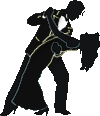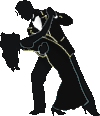
Ballroom Dance
J M (Mike) Nelson
Email:jmnelson@cloudnet.com
Phone: 612-810-0157

| jmnelson.com | Dance Home Page | Dance Curriculum | Dance Articles |
 |
Ballroom DanceJ M (Mike) Nelson |
 |
Profession
We use the terms profession and professional in many different contexts in our daily speech, ranging in meaning from primary occupation, or occupational aspiration (e.g. I'm a professional wrangler, but for now I work at a car wash.), to the highest level of occupational requisites (e.g. Dr. Mozek is a licensed brain surgeon.). In ordinary language, the term is rather vague; however, more formally, profession refers to a paid occupation that involves extensive training terminating in some form of certification. Training and certification implies specialized knowledge, and specialized knowledge implies scholarly inquiry for the advancement of knowledge in the profession. The profession might also require some form of licensure. Hence, one might derive several characteristics of a profession not usually considered in ordinary conversation. Scope of Inquiry. Requisite knowledge must come from sources recognized as authoritative by the profession. Clearly many of these sources would be related professions, such as communication and computation professions; however, the use of language, media, mathematics, and related intellectual and physical tools are determined by the profession itself, not by outsiders, who are not privy to professional intricacies. In addition, there is the implication that the profession holds considerable knowledge and skills that are unique, for it is just such knowledge and skills, or at least claims of same, that set the practitioners apart. Therefore, there must be some component within the profession that engages in inquiry regarding professional knowledge and practice; furthermore, such inquiry implies some mechanism for validating and disseminating the results of professional inquiry. Traditionally, such validation and dissemination is done through professional journals, independent of outside influence, and whose content is validated by peer review. This component is critical to any profession, for members of the profession should be those best prepared to initiate inquiry and evaluate findings. ©2010, JMNelson |
| jmnelson.com | Dance Home Page | Dance Curriculum | Dance Articles |
Copyright (c) 2006, J. M. Nelson. All rights reserved. Reproduction of contents prohibited without prior permission from the author.